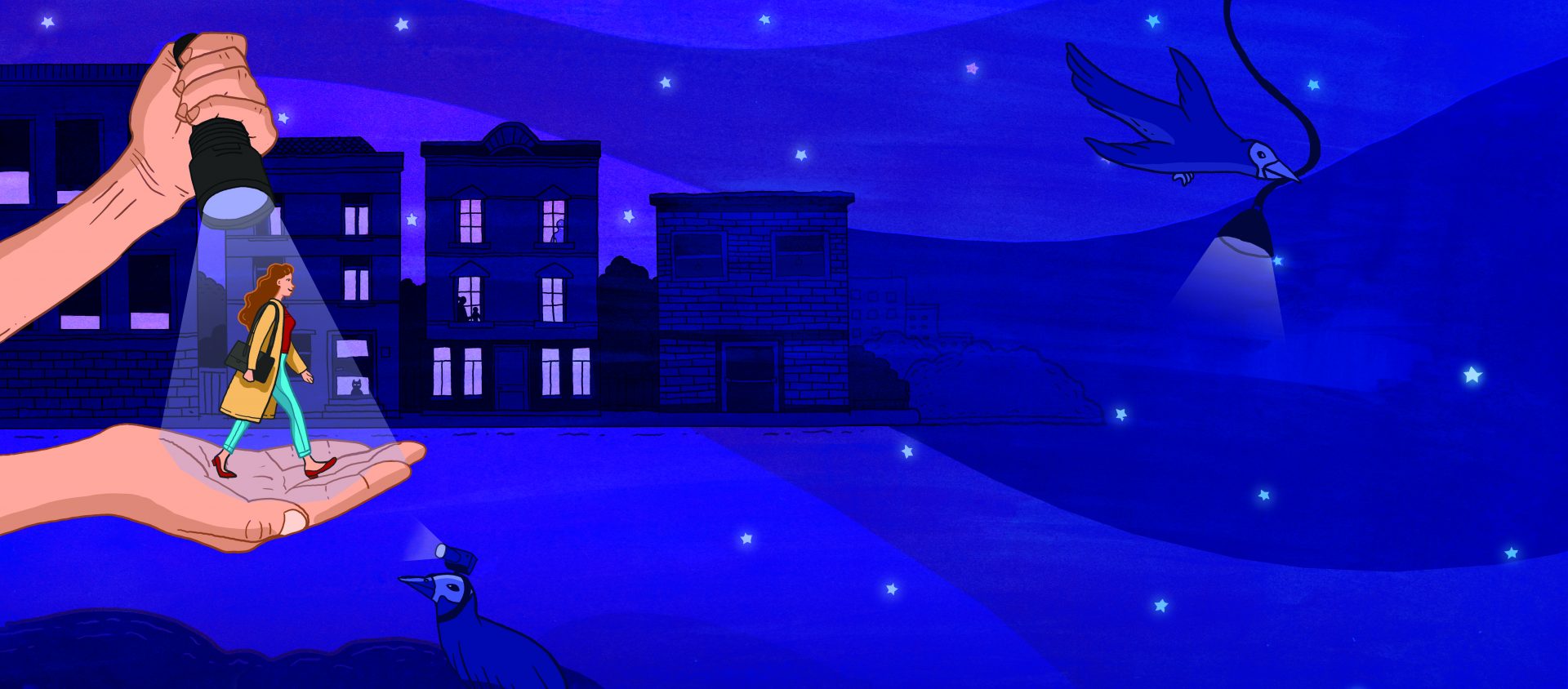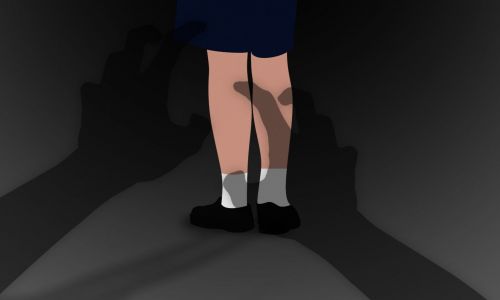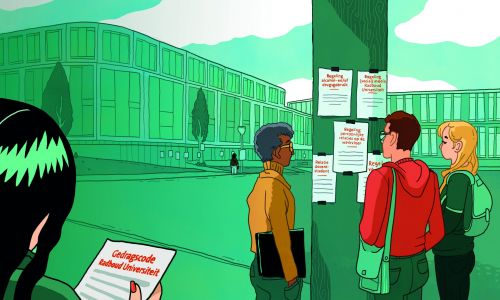Small changes in behaviour can create safety in the publice space: ‘As a man, why don’t you take an alternative route?’
-
 illustratie: Ivana Smudja
illustratie: Ivana Smudja
Even if a man has no bad intentions, a woman walking in a dark street at night might still perceive him as a threat. Gijs Hablous, PhD candidate at the Political Science department, believes that men should be more aware of this. ‘If we can change our behaviour in small ways to create a greater sense of safety in the public space, the burden will be distributed more evenly.’ He’s decided to take the first step.
It was a cold and drizzly night. Sunk deep in the hood of my jacket, with music in my ears, and without paying much attention to my surroundings, I was walking home, at the time still in Nijmegen-West. The station tunnel was part of my usual route when leaving the city via the Bloemerstraat. It was only after walking behind her for a while that I started to notice it. The woman walking a few metres ahead of me kept turning her head. Sometimes, she’d stare at me for a moment. Mostly, it was a quick glance, almost fearful. She saw me as a potential danger.
New Vox
This blog can be found in the new Vox magazine, a special on transgressive behaviour. You can find the magazine in the stands around the campus, or you can read it online.
That moment, a few years ago now, was not the first or the last time that I noticed something like this on a night-time walk. I mostly remember feeling helpless: how can I signal that I’m not a threat to her without coming across as creepy? The world is full of men with and without bad intentions, and there’s no stamp on our forehead proclaiming which category we belong to.
Impact
Plus, it isn’t about our good intentions. The fact that we are men, and are seen as men, is enough to create the kind of situation I described above. In nine out of ten cases, the perpetrators of sexually transgressive behaviour are men. When it comes specifically to street harassment, the victims are more often women than men (and more often transgender than cisgender persons). According to a recent study by Statistics Netherlands (CBS), two thirds of young women (12-25 years old) and one third of young men in the Netherlands experienced some form of street harassment in 2020 or 2021. Remarkably, Statistics Netherlands did not ask respondents about the sex or gender of the perpetrators.
‘One friend usually takes a round-about route to go home at night’
The survey did show that not only the frequency, but also the impact of street harassment varies, depending on whether the victims are male or female. More than one third of young women occasionally feel unsafe because of street harassment, as opposed to 5% of the young men. No wonder women are keeping their guard up.
When I ask my female friends whether they do, or refrain from doing, certain things to increase their safety, most answer affirmatively. One friend usually takes a round-about route to go home at night, for example to avoid the Goffertpark. The more people and light, the better, she says. Another friend doesn’t like walking through the station tunnel, despite the bright lights. A past experience with physical violence in the tunnel has made her fearful of walking through it.
Keychain
Almost every woman I speak to turns out to have developed all kinds of tricks: making a real or fake phone call, walking faster, putting on headphones and avoiding eye contact. A few even prepare for a potential physical confrontation: clutching their fists around their keychain with the keys sticking out between their fingers to defend themselves against a potential attacker. This is probably no news to many women. To some men, it might be quite enlightening.
This was indeed the case for a male friend of mine who I spoke to as I prepared this article. I asked him what he does when a woman on the street perceives him as a potential threat. He told me he had asked his female friends about this after his sister had told him about two of her recent experiences with street harassment. The conversations with his friends opened his eyes to ‘what girls and women have to put up with’, and the adaptive behaviour that many of them have almost automatically developed in response. His practical answer to my question was: ‘As a man, just cross the street and make sure a woman can see you’. Sometimes it’s as simple as that.
‘What I really want is for them not to be afraid of my presence on the street’
And as necessary. There’s a clear unbalance, there’s no harm in men also making some adjustments. If we can change our behaviour in small ways to contribute to a greater sense of safety in the public space, the burden will be distributed more evenly. Looking at it from this perspective, I like what another friend of mine wrote: ‘I try to create safety (…) by keeping a distance or taking an alternative route.’ Just to be on the safe side he sometimes takes a detour just so a woman doesn’t get the feeling that he might be following her.
Another friend shares that he sometimes calls someone up on purpose and has a friendly chat, just to make it clear to a woman walking on the street that his attention is not focused on her. And here’s a tip from a female friend: ‘Talking about stranger danger: as a man on you own, just don’t strike up conversations with women walking alone at night.’ Don’t even ask for a cigarette or for directions under those circumstances.
Raising awareness
I’m positively surprised by the awareness shown by my male friends when it comes to understanding their position. Although one of the men I spoke to correctly pointed out that my sample is hardly representative of society as a whole, my friends’ responses still leave me feeling hopeful. If having these conversations in a small circle is helpful here, it might just work elsewhere too. The friend who became more aware of his role after hearing about his sister’s experience has since also shared the stories of his female friends with other men, ‘without revealing personal details, of course.’
Despite this kind of awareness raising, situations in which a woman perceives a man as a threat will continue to arise. How does this make men feel? When asked about it, my friends say that what matters is not their feelings, but the woman’s experience. ‘It’s not so much that I want to be seen as “a good guy”,’ says one of them. ‘What I really want is for them not having to be afraid of my presence on the street.’ By saying this, he is already contributing to turning his wish into reality.
Gijs Hablous is conducting PhD research on intersex norms at the Political Science Department.



